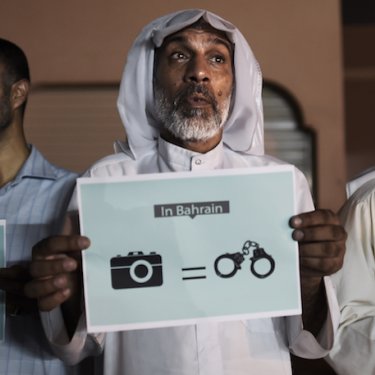Long jail terms for two journalists convicted on no evidence

Reporters Without Borders (RSF) is appalled by a Bahraini court’s arbitrary conviction of a blogger and a journalist on terrorism charges last week although no hard evidence was brought against them. One was sentenced to life imprisonment, the other to 15 years in prison.
RSF is becoming more and more concerned about the situation of the media in the Kingdom of Bahrain, where the restrictions on access to information keep on growing and imprisoned journalists are mistreated.
“Media freedom has been stamped out in Bahrain,” said Alexandra El Khazen, the head of RSF’s Middle East desk. “The persecution of the regime's critics is being stepped up and the spaces for free speech keep on being reduced. We are sounding the alarm and we call on the authorities to stop the arrests and arbitrary convictions of journalists and bloggers, including those carried out on the pretext of combatting terrorism".
Blogger Ali Al Mearaj and newspaper journalist Mahmood Al Jazeeri were convicted by a criminal court on 30 October of “support for terrorist activities” and were sentenced to life imprisonment and 15 years in prison respectively.
Why they were lumped together with some ten other defendants in this terrorism trial is unclear and, according to their lawyers, the prosecution produced no hard evidence to support their conviction. RSF has learned that their lawyers, who plan to appeal, have yet to receive a written – a therefore definitive – version of the court’s verdict.
Mearaj was incorporated into this terrorism case after his arrest in June 2016. He was previously jailed for 27 months on charges of “misusing information technology” and insulting the king.
A journalist with Al Wasat, an independent daily that has been closed by the authorities, Jazeeri has been held ever since he was arrested at his home in December 2015. As with Mearaj, it was in June 2016 that the terrorism charge was brought against him.
Both Mearaj and Jazeeri have also been stripped of the Bahraini nationality. This form of punishment is becoming more and more frequent, according to Bahraini organizations based abroad. Its victims include the award-winning freelance photographer Sayed Ahmed Al Mousawi.
The Bahraini authorities do not hesitate to fabricate charges in order to silence journalists. On 30 October, an appeal court upheld the five-year jail sentence imposed in September 2015 on sports journalist Hassan Ghareeb for allegedly participating in an attack on a police checkpoint although he was covering a football match at the time.
Mistreatment in prison
Detained journalists are furthermore exposed to appalling conditions in prison. RSF has learned that the photographer Ahmed Humeidan has an eye infection that needs to be treated in a specialized hospital, according to the doctor who examined him.
But the prison authorities are refusing to transfer him to the hospital, thereby denying him appropriate medical treatment, on the grounds that this would pose security problems.
Detained since December 2012, Humeidan is serving a ten-year jail sentence that was upheld by a Manama appeal court in September 2014. He was convicted of involvement in an attack on a police station although he was elsewhere at the time.
The well-known human rights defender and blogger Nabeel Rajab was meanwhile transferred two weeks ago to Jaw prison, which he had often criticized in tweets for its frequent use of torture.
According to the information gathered by RSF, the prison authorities have isolated him and have restricted his visits. They are also subjecting him to humiliating practices and are limiting his access to clothes and books.
Tougher line with international press
The authorities are not just silencing Bahraini media such as Al Wasat, the independent local paper that was closed arbitrarily in June. Restrictions on the foreign media have also been stepped up in the past year.
Neither Agence France-Presse, Reuters, the Associated Press, France 24 nor Radio Monte Carlo Doualiya has an accredited correspondent in Bahrain any more. The BBC and CNN have not had correspondents for even longer, while Al Jazeera ceased to have a correspondent in 2011.
A total of 15 journalists and citizen-journalists are currently detained in Bahrain. They include the blogger, intellectual and human rights defender Abduljalil al-Singace and the photographer Jaffar Marhoon, who were given life sentences in 2011 and 2015 respectively.



